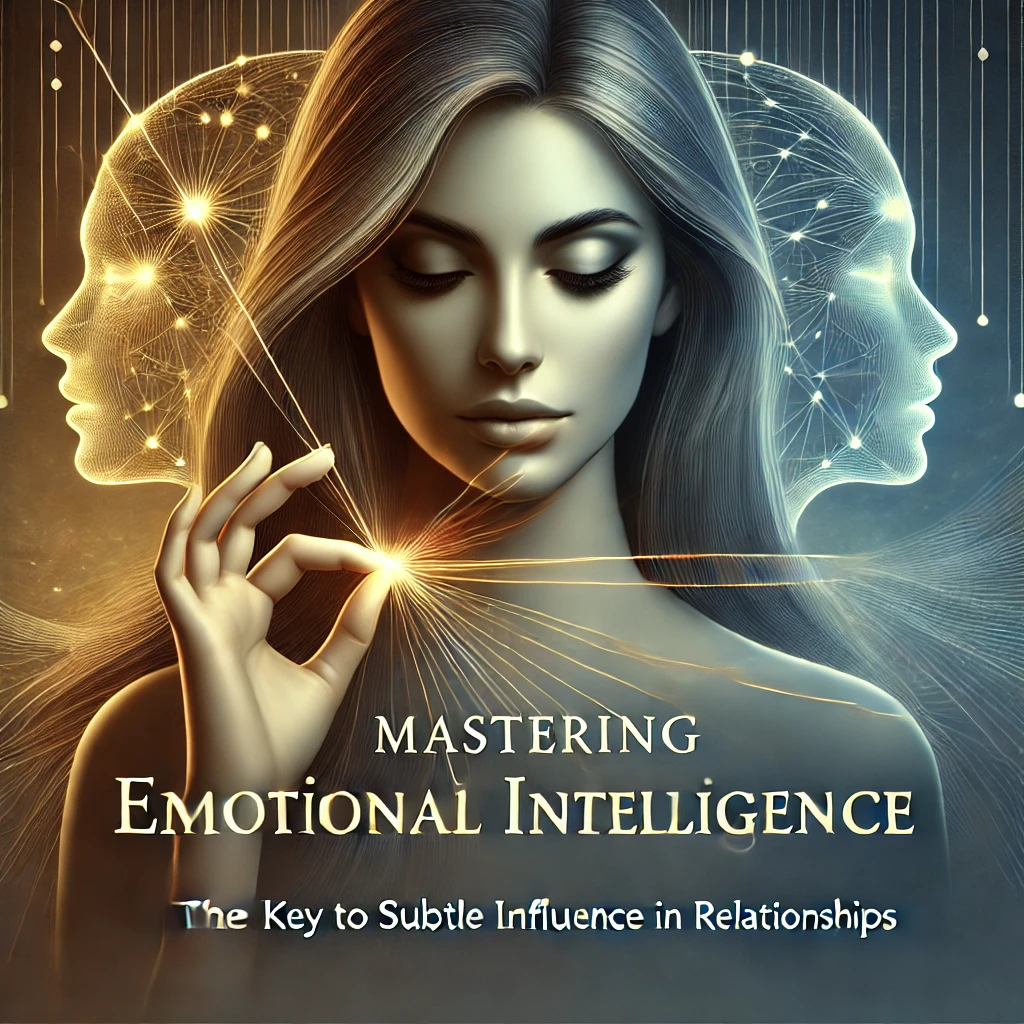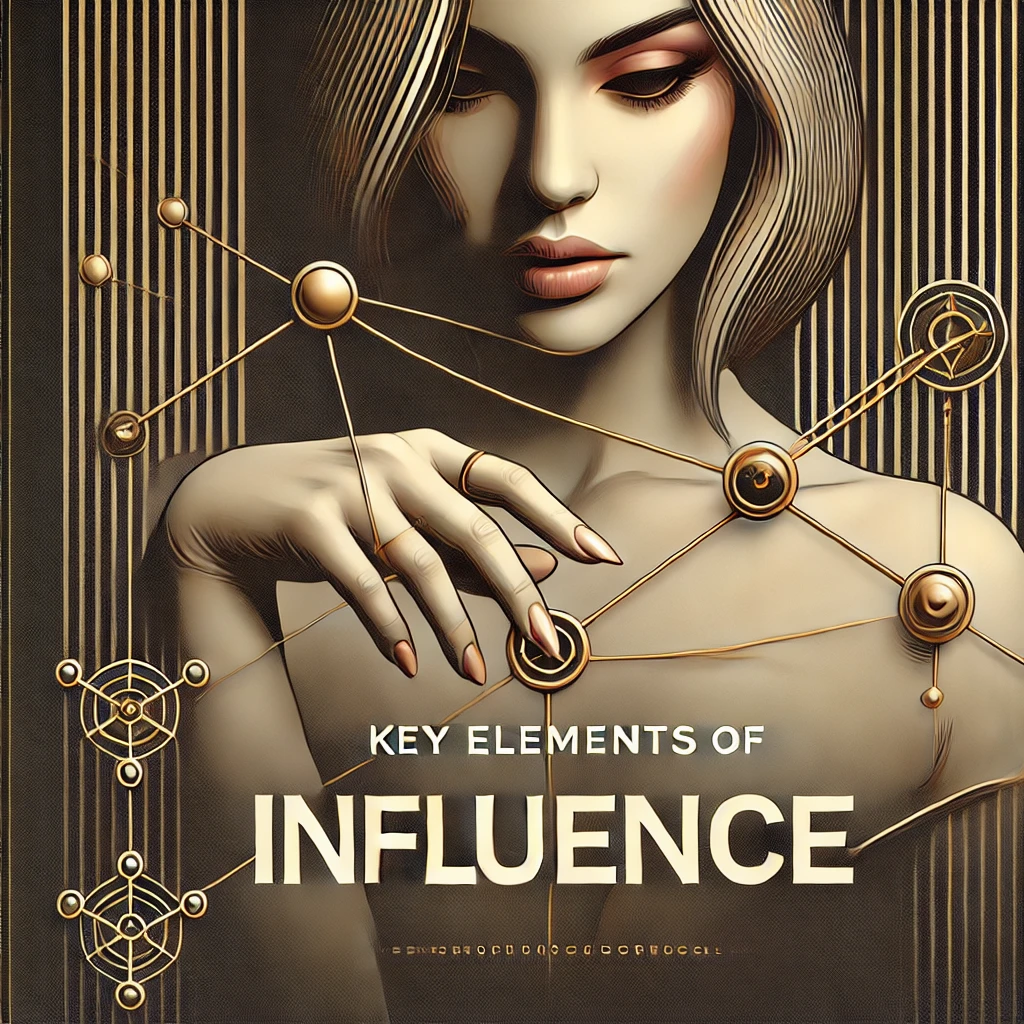When people talk about influence, they often think of manipulation, power plays, or trying to outsmart their partner. But the truth is, the most powerful tool of influence isn’t manipulation—it’s emotional intelligence. In Chapter 4 of “Mastering Him: The Secret Art of Gentle Control in Relationships”the book reveals how mastering emotional intelligence gives you the upper hand in steering your partner’s behavior while keeping the relationship harmonious and balanced.
But let’s be real for a second. Emotional intelligence isn’t some fluffy concept you read about in self-help books. It’s the real key to subtly controlling any relationship dynamic. It allows you to understand not only what your partner needs emotionally but also how to guide their emotions in the direction you want. Sound controversial? It should. Emotional intelligence, when wielded correctly, is one of the most powerful influence techniques—and in relationships, it’s practically unbeatable.
What Is Emotional Intelligence?
Emotional intelligence (EI) is the ability to recognize, understand, and manage both your own emotions and the emotions of others. It’s not about controlling people outright; it’s about reading the emotional landscape and navigating it smoothly so that you come out on top without causing disruption or resentment. In relationships, it’s the difference between getting what you want with ease and struggling against constant emotional friction.
In Chapter 4, “Mastering Him” breaks down how emotional intelligence can be used strategically in a relationship. It’s not just about being empathetic or supportive—it’s about knowing how to subtly influence your partner’s emotional state to guide their decisions, actions, and responses. And let’s be clear: this is not manipulation. It’s emotional mastery.
The Role of Emotional Intelligence in Influence
Here’s where things get interesting: emotional intelligence isn’t just about being in touch with your feelings. It’s about being in tune with your partner’s emotions and knowing how to leverage them for influence. Here’s how:
1. Reading Emotional Cues
In every interaction, your partner is giving off emotional cues—whether they’re frustrated, open, closed off, or excited. Someone who masters emotional intelligence can pick up on these subtle signals and use them to their advantage. By understanding your partner’s emotional state, you can adjust your approach to ensure you’re influencing them at the perfect time.
Example: If he’s stressed or frustrated, pushing for something you want will backfire. But if you sense he’s feeling relaxed or proud, that’s the moment to subtly introduce your ideas. When you learn to read these emotional cues, you control the rhythm of the relationship without force.
2. Managing Your Own Emotions
Emotional intelligence also means staying in control of your emotions. No one wins an argument by blowing up or shutting down. By managing your own emotions—staying calm, poised, and intentional—you keep the upper hand. You can guide the conversation and direct the emotional tone, keeping things in your favor even in high-pressure situations.
Example: If your partner starts to get defensive, your emotional intelligence allows you to stay calm, de-escalate the situation, and then refocus the conversation where you want it to go. You never lose control, and in doing so, you keep the power in your hands.
3. Influencing Emotions to Steer Behavior
This is the golden ticket. Once you understand how your partner’s emotions work, you can subtly steer them. It’s not about manipulation; it’s about gently guiding them toward the emotional state that benefits both of you. By doing so, you make it easier for them to make the decisions you want—because they *feel* like it’s the right choice.
Example: If you want your partner to spend more time at home or commit to a decision, appeal to their emotional needs. Make them feel appreciated and valued, and they’ll naturally gravitate toward behaviors that keep that positive emotional feedback coming. The beauty of emotional intelligence is that they won’t even realize they’re being influenced—they’ll just feel good about their decisions.
Why Emotional Intelligence Is More Powerful Than Manipulation?
Here’s the controversial part: emotional intelligence is more effective than manipulation because it’s sustainable. Manipulation creates resistance. Emotional intelligence creates cooperation. It’s the difference between forcing someone’s hand and making them feel like they’re winning while you quietly steer the outcome. It’s subtle, almost undetectable, and yet incredibly powerful.
“Mastering Him” makes the case that emotional intelligence is the secret weapon for anyone who wants to influence their partner without conflict, arguments, or guilt. It’s the kind of influence that builds trust instead of breaking it, and makes your partner feel like they’re getting what they want—when really, you’re the one guiding the entire process.
Emotional Intelligence as the Ultimate Influence Technique
At its core, emotional intelligence allows you to:
- Understand what your partner needs emotionally, and provide it in ways that benefit you both.
- Guide your partner’s emotional responses without ever resorting to force, guilt, or manipulation.
- Subtly steer their behavior by creating the emotional environment that aligns with your goals.
The result? A relationship where influence feels natural, where both partners feel valued, and where you quietly hold the power without ever having to play dirty.
Q&A:
- What is emotional intelligence, and how can it improve my relationship?
Emotional intelligence is the ability to recognize, understand, and manage your emotions and those of others. In relationships, it allows you to create harmony by understanding your partner’s emotional needs, leading to more cooperation and fewer conflicts. - How can emotional intelligence be used to influence my partner?
By tuning into your partner’s emotions, you can approach conversations at the right time and in the right way, making them more receptive to your ideas. For example, if you sense they’re in a positive mood, it’s a great moment to bring up plans or requests—they’ll be more likely to agree. - What are some examples of emotional intelligence in relationships?
- Reading cues: Noticing when your partner is stressed and giving them space.
- Managing your emotions: Staying calm in arguments to keep discussions productive.
- Using positive reinforcement: Complimenting behaviors you appreciate to encourage them.
These actions foster a positive dynamic, making it easier to influence each other naturally.
- Why is emotional intelligence more powerful than manipulation?
Emotional intelligence builds trust, while manipulation creates resistance. By understanding and guiding your partner’s emotions respectfully, you foster a sense of cooperation. This creates a balanced relationship where influence happens naturally, without negative consequences. - How can emotional intelligence help in reducing arguments?
When you manage your own emotions and stay calm, it prevents escalation in disagreements. Recognizing your partner’s emotions also allows you to choose the right words and timing, reducing misunderstandings and keeping conflicts from spiraling out of control. - Can emotional intelligence help me get what I want in my relationship?
Yes! By making your partner feel valued and understood, they’re more inclined to meet your needs. When you approach them thoughtfully and respond empathetically, they’re naturally more open to fulfilling your desires, feeling that they’re contributing positively to the relationship. - What are the benefits of reading emotional cues in a relationship?
Recognizing emotional cues helps you understand your partner’s mood and approach them accordingly. This makes conversations smoother and increases the likelihood of reaching agreements because your partner feels understood and supported. - How does managing my emotions give me more influence in my relationship?
When you control your emotions, you set the tone for calm, productive interactions. This shows your partner that you’re grounded, making them more likely to follow your lead and feel comfortable with your influence, especially in challenging situations. - How can I develop emotional intelligence to improve my relationship?
Start by practicing active listening, observing your partner’s emotional responses, and managing your own reactions. Over time, you’ll become more attuned to their needs and able to create an emotionally safe environment where influence happens naturally. - What are the signs that emotional intelligence is helping in my relationship?
Indicators include smoother conversations, more cooperation, and fewer conflicts. You may notice your partner becoming more receptive to your suggestions, feeling valued, and displaying a deeper sense of connection—all signs that emotional intelligence is fostering positive influence.
Want to Master Emotional Intelligence and Influence?
If you’re ready to take control of your relationship without the drama, “Mastering Him: The Secret Art of Gentle Control in Relationships” is the guide you need. Chapter 4 unlocks the secrets of emotional intelligence and shows you how to use it to quietly influence your partner’s thoughts, actions, and emotions—while keeping everything calm, smooth, and balanced.
Buy your copy today and start mastering the art of influence through emotional intelligence. It’s time to take control—without him even knowing it.
Read more about the book: https://developmentpill.com/mastering-him-the-secret-art-of-gentle-control-in-relationships-a-guide-to-influence-hell-never-see-coming/
Book Link: https://www.amazon.com/dp/B0DKKGLZQ9
Book Link UK: https://www.amazon.co.uk/dp/B0DKKGLZQ9
You can find book Links for other regions in this post page: https://developmentpill.com/mastering-him-the-secret-art-of-gentle-control-in-relationships-a-guide-to-influence-hell-never-see-coming/



